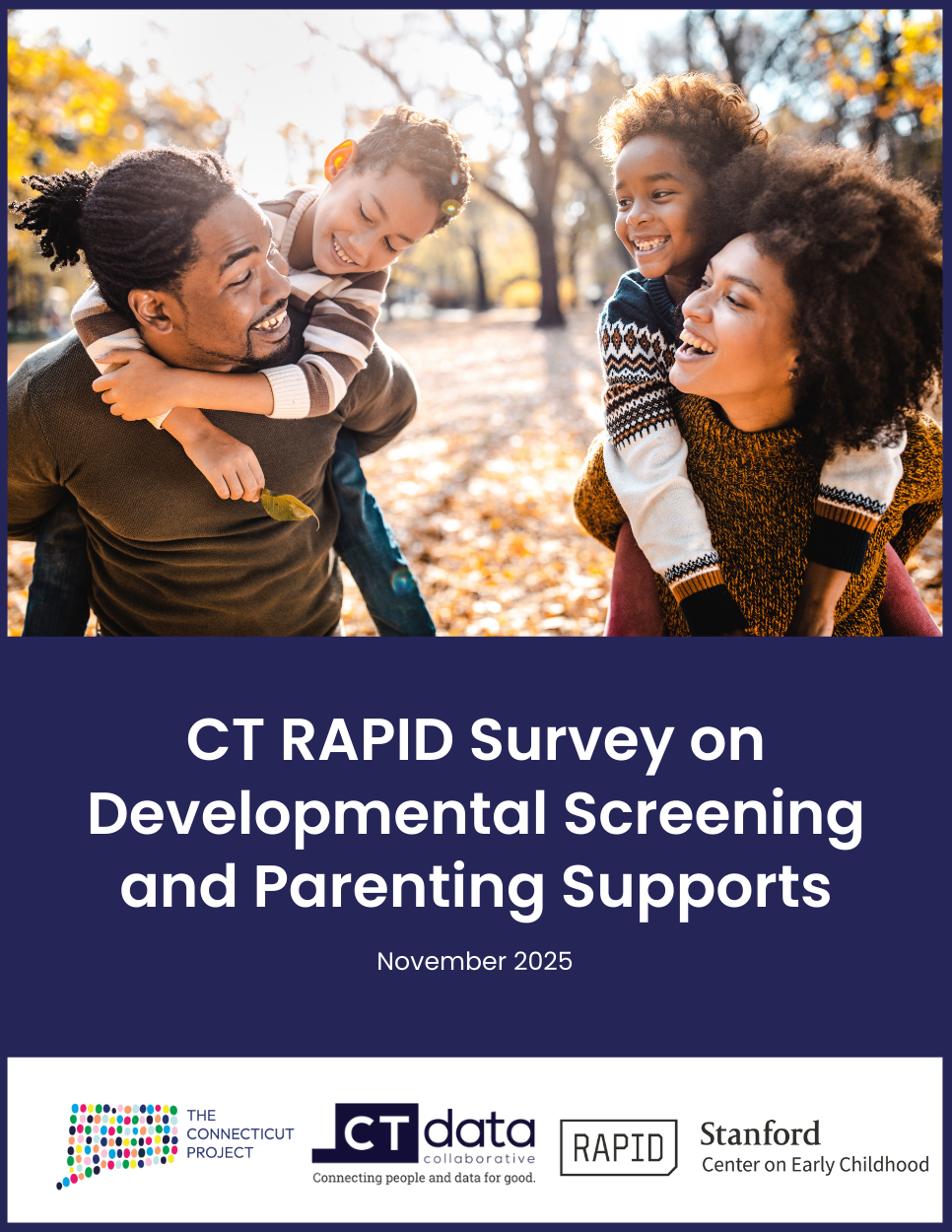Connecticut RAPID Survey 2:
Developmental Screening & Parenting Supports
November 2025
The Connecticut RAPID survey on Developmental Screening and Parenting Supports received responses from 2,207 primary caregivers of children under 6 years old from 152 towns across Connecticut.
This survey asked about:
Developmental screening and connection to services, including whether and how children were screened for developmental delays, and parents’ experiences getting connected with and accessing services for their children.
Parenting supports, including whether and how parents were accessing parenting supports and resources, what additional supports parents would find useful, and how confident and connected respondents are feeling as parents.
Universal developmental screening, timely connection to services, and access to parenting resources and supports are essential for fostering children’s healthy development.
The results provide insights into areas of strength as well as inequities and gaps that should be addressed with policies and programs that are responsive to families’ and children’s needs.
It is important to note that survey respondents are not representative of all families with young children across the state. Families were recruited through community-based organizations, some of which provide early intervention, home visiting, and clinical therapeutic services to families and children. Survey respondents are therefore more likely to receive these services relative to families statewide. Additionally, survey respondents tended to have lower household income than families statewide.
Key Findings
Developmental Screening and Access to Services
One in five children ages 1 to 5 years had not received a developmental screening from any source – including pediatricians, child care providers, and caregivers at home – within the past year.
Two in five children ages 1 to 3.5 years had not received a developmental screening from a pediatrician in the past year, as recommended by the American Academy of Pediatrics.
Concerns raised by a professional resulted in a referral for evaluation more often than when a parent raised a concern with a professional (63% of concerns raised by a professional vs. 44% of concerns raised by a parent).
Three in five parents were satisfied with the support they received getting connected to services for developmental concerns and three in four reported that these services met their children’s needs.
Higher-income and White parents were more likely to report that it was easy to access services for their children and that these services met their children’s needs.
Parenting Supports
Among parents who speak a language other than English in the home, roughly one in four said that they do not have access to parenting resources in a language they feel comfortable speaking.
Three in four parents – and 82% of parents of a child with a disability – reported that they could benefit from additional parenting resources and supports.
Many parents expressed a preference for receiving additional parentings resources via newsletters, texts, or parenting apps.
Parents were particularly interested in additional resources related to child behavior management and promoting a healthy parent-child relationship.
More than four in five parents reported feeling confident about their parenting skills, but nearly half (48%) reported feeling overwhelmed by their parenting responsibilities. Among parents of children with disabilities, more than half (57%) reported feeling overwhelmed.
Recommendations
These findings suggest that policy and programmatic changes are needed to:
Ensure that all young children receive developmental screenings as recommended by the American Academy of Pediatrics.
Assess the frequency with which valid concerns from parents about their children’s development are not acted on by pediatricians and other early childhood professionals.
Promote equitable access to services to address developmental concerns for families of different income levels and racial and ethnic identities.
Increase the provision of parenting resources – particularly on behavior management and promoting a healthy parent-child relationship – in easy-to-access formats such as digital newsletters, and in a greater variety of languages.
Provide more parenting resources and supports specifically for parents of children with disabilities.
Acknowledgements
The Connecticut RAPID Survey is part of the RAPID Survey Project led by Dr. Philip Fisher and Cristi Carman at the Stanford Center on Early Childhood. The Connecticut RAPID Survey project is directed by Courtney Parkerson at The Connecticut Project. This report was authored by Chase Wilson and Cynthia Willner at CTData Collaborative.
This work was funded by The Connecticut Project. The Connecticut Project is a philanthropic, advocacy, and mobilizing organization that brings together people, ideas, and resources to build opportunity for working class people throughout the state of Connecticut.
We gratefully acknowledge the parents who responded to the survey, the 17 CT RAPID Community Partners who brought the survey to parents of young children across Connecticut, the CT RAPID Advisory Committee, and Stanford’s CT RAPID Project Team for their contributions to this work.





